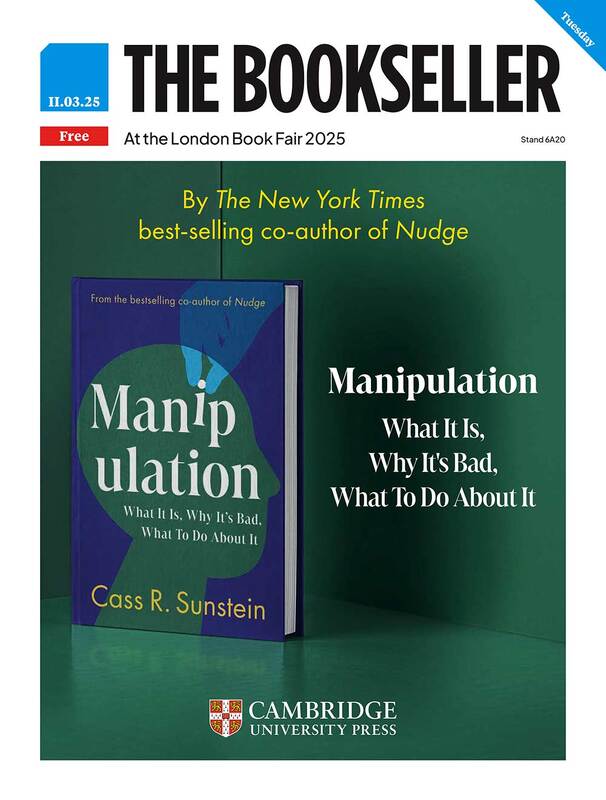You are viewing your 1 free article this month. Login to read more articles.
Publishing attempts to keep things on track during coronavirus outbreak
Publishers are exploring flexible working arrangements with their staff as fears over the coronavirus grow, with the Booksellers Association (BA) warning that it is “extremely concerned” about the impact on bookshops. There are also concerns around book launches and author events. Hachette is trialling a working from home day on Friday (13th March), with Amazon also asking staff to work from home.
Waterstones has said it “plans to continue to trade as normal and host bookshop events as planned”, but on Friday suspended the announcement of its Children's Book Prize until the summer. Blackwell’s, whose directors are meeting weekly to review the situation, is “mindful that we should keep our response proportionate to the evidence and guidance given by Public Health England”. Blackwell’s conceded that “in the event of a lockdown, it isn’t possible to fully mitigate the effects of an extended period of closure”.
The BA has now expressed concern for retail in the current climate. “With the spread of the virus, and the limitations being imposed on gatherings, we remain extremely concerned about the impact of this situation on bookselling,” said BA m.d. Meryl Halls.
“Compromised consumer movement and consumer confidence will inevitably hit the high street, which is already in a fragile state, and while we clearly need to take care with public health and contagion spread, we also need to carry on with commerce and with community engagement.”
Jonny Geller, chairman of Curtis Brown and c.e.o. of Original Talent, said he anticipated movement in the publication dates of “major” titles would help to overcome some of the disruption, and publishers should also be helping themselves by tailoring their approach for customers who might end up being stuck at home with more reading time on their hands. “Publishers will need to direct their marketing resources to online rather than outdoor advertising, make titles visible beyond the Amazon homepage, and incentivise bricks-and-mortar retailers to target customers who can’t leave home,” said Geller.
“I presume some major titles will move to summer to allow for book tours and footfall in bookshops to resume, but clearly more isolation means more reading time. I think everyone—printers, retailers, publishers and agents—will be affected by this crisis. Demand will fall and supply will be hesitant as caution hits the market. This is temporary. We will, doubtless, learn new patterns of reading and selling books, but this is a disruption, not an existential threat.”
Limiting the impact
The trade has been working on precautionary measures to avoid the spread of the virus and reduce potential for cross-infection, as well as to limit any detrimental financial impact.
In addition to monitoring the situation for the wellbeing of staff, Pearson has been working to help large numbers of students it supports around the world to ensure they can carry on learning. With many affected by travel restrictions and school closures as a result of the epidemic, it has launched projects in Italy and China to support teachers and students for the whole period of interrup- tion, providing free online learning resources and online training.
Closer to home, Hachette UK’s HQ at Carmelite House will be emptied on Friday 13th March as part of its “business continuity planning”, with all staff told to work from home for a one-day “test”. A spokesperson said: “We can’t comment on individual employees, but there have been no confirmed cases of coronavirus among our staff to date. We are monitoring the situation daily and will of course take immediate action if needed.
“In the meantime it’s business as usual, but we are taking some precautionary measures, including postponing non-essential travel, deep cleaning our offices regularly and ensuring everyone is set up to work from home if needed. We are also allowing any staff who are at higher risk due to underlying health conditions, or those who care for vulnerable relatives, to work flexibly if they have concerns.”
For most publishers and agencies that The Bookseller spoke to, more flexible working and limiting non-essential business travel and gatherings has formed part of their planning. A spokesperson for HarperCollins said it was “prepared for increased numbers of people working remotely if and when that becomes necessary”, and while it “continues to keep our working environment as protected as possible”, it will be restricting non-essential business travel and reducing the number of face-to-face meetings in favour of telephone and video-conferencing.
Bonnier Books UK, whose teams have also been busy organising “virtual meetings”, hasn’t specifically requested that staff work from home, but it already has a flexible working policy in place, enabling staff to travel outside peak hours if they prefer.
Pan Macmillan is limiting “larger, non-business-critical social gatherings”, it said, and issuing guidance to all publicists on how to handle author/illustrator tours. M.d. Anthony Forbes Watson said: “We are trying to ensure that decisions are swift, clear and well communicated, and that we enable people to manage business as usual to the greatest extent possible, acknowledging that some disruption is probably inevitable.”
Events cancelled
This week would have marked the 49th edition of the London Book Fair. But the fair was cancelled last week, with attendees hosting hastily rearranged meetings via Skype. On Wednesday (11th March), the once-delayed Bologna Children’s Book Fair was also cancelled. In Italy, where cases have been confirmed in all 20 regions, the country is currently on lockdown and unsurprisingly a string of major publishers this week announced they would be absent from the rescheduled Bologna fair. After Simon & Schuster pulled out on grounds of health and safety last Friday, Penguin Random House and DK, then Hachette and Bonnier Books UK followed suit on Tuesday and Wednesday, respectively.
“In these days we are dealing with a genuine emergency,” said Antonio Bruzzone, general manager of BolognaFiere, “one that involves not only our country but, unfortunately, has an international dimension. The need to contain the spread of the coronavirus has made it necessary to introduce strict limits on travel between countries, thus having a significant effect on all forms of business... It was not easy to take the decision to postpone the event until 2021, but we have done so in the knowledge that we are providing an important contribution to overcoming this current situation.”
Fortunately, many in the children’s book trade had yet to re-book hotels and flights. One agent said it was “looking increasingly unlikely” that the fair would go ahead; in Italy all public gatherings have been banned and sporting events suspended, while people have been told not to leave their homes other than for work or emergencies. The measures took effect on Tuesday (10th March) and are expected to last until 3rd April.
The welfare of staff, colleagues and authors is paramount, all corners of the trade have said, and cancellations of literary events in the UK are now also ramping up. Although the Hay Festival (21st‚Äì31st May) and the Edinburgh International Book Festival (15th‚Äì31st August) are still scheduled to go ahead as planned, latest casualties include Jenny Offill’s UK tour for Weather (Granta), the Windham Campbell Prizes ceremony and FANE’s Words Weekend festival, all of which were due to take place this month.
Alex Fane of FANE Productions said on Monday: “We call on the government and theatre governing bodies to be as clear as possible as soon as possible.” He added that the Australian authorities had been sending out regular updates about cases and advice: “It’s excellent, and we haven’t seen that sort of clarity here.”
Chancellor Rishi Sunak said he expects this week’s budget to “protect the vast majority of businesses through the worst of the crisis”. Helpfully, business rates for the coming year will be abolished for small businesses, and a new Coronavirus Business Interruption Loan Scheme will see banks offer loans of up to ¬£1.2m to support small and medium-sized businesses.















